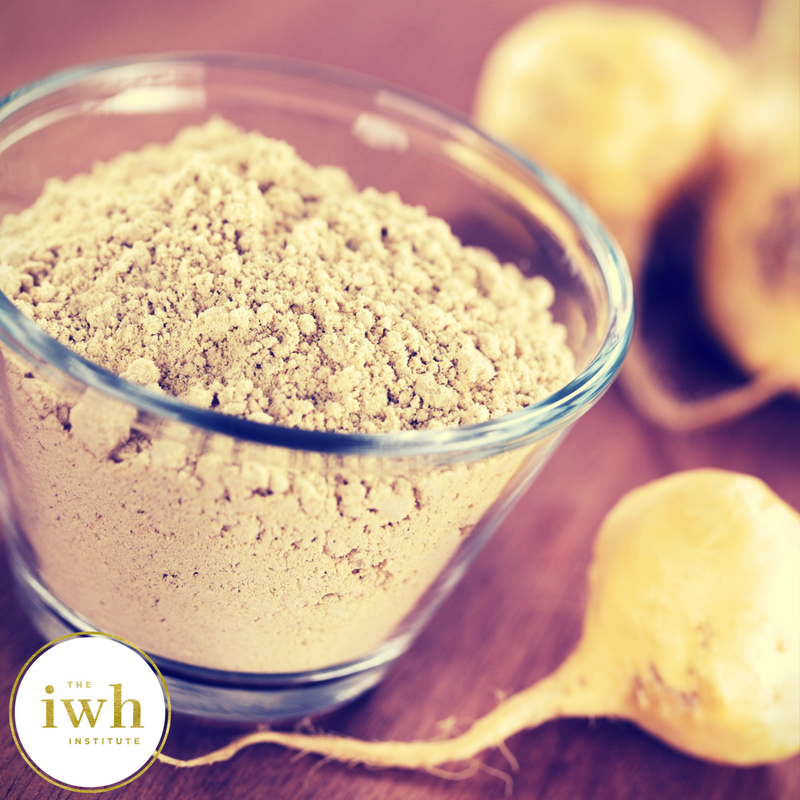What’s the evidence on Maca?
Is there any evidence that adding that scoop of Maca powder to your smoothie is a good idea? Are maca powder benefits all that they’re hyped up to be?
As with nearly everything… the answer is, “It depends.”
In my practice, I recommend Maca for specific situations and it works very well. But, in some situations, using maca can actually worsen your client’s symptoms. Let’s tease out the data.

Maca is best studied in perimenopausal and postmenopausal women for improving hot flashes and other symptoms of menopause (Comhaire & Depypere, 2015 and Depypere & Comhaire, 2014), a few randomized controlled trials have proven its effectiveness in these populations (Lee et al., 2011).
In a small, randomized, double-blind, placebo-controlled, cross-over study conducted on postmenopausal women in Hong Kong and China, reductions in blood pressure and depression were found, but there were no significant differences found in hormone levels or serum cytokines at doses of 3.3 grams per day (Stojanovska et al., 2015).
Reductions in anxiety and depression were found in another small study looking at postmenopausal women as well (Brooks et al., 2008). Additionally, there is limited evidence (one randomized, double-blind, placebo-controlled, crossover trial on fourteen postmenopausal women), that Maca improves sexual function, but again, no effect on hormone levels was found (Brooks et al, 2008).
How is Maca used clinically?
Clinically, I do recommend maca to my clients who are perimenopausal to postmenopausal and who need support with depression, anxiety, low libido, and reduction of menopausal symptoms. However, I do not use it with women who are struggling with estrogen-dominant issues (endometriosis, ovarian cysts, and fibroids) as it seems to exacerbate them.
However, this may be more of a belief or placebo effect, because I could find very little evidence that Maca is estrogenic. It has not been found to bind to estrogen receptors (Powers & Setzer, 2015). The above studies that did find improvements using Maca on psychological symptoms, libido, and menopausal symptoms, did not find changes in hormone levels.
However, there is one study on a specific, commercially available preparation of Maca (Maca-GO or Femmenessence) that did show significantly stimulated production of E2 (Meissner, et al., 2006.)
Because of the limited data available on Maca, I prefer to use it as a food-based supplement and add it to smoothies when my client feels that she needs support for her mood, libido, energy, or menopausal symptoms such as hot flashes.
My preferred Maca supplement that I personally use in my smoothies is Mighty Maca, which is a supplement that was developed by my friend and colleague, Dr. Anna Cabeca after her travels around the globe to research tools for her own hormonal healing.
I also use Mighty Maca when my clients need detoxification support as it contains sources of antioxidants and cruciferous vegetables in addition to Maca. The recommended dose is between 2 grams and 3.3 grams per day.
The Mighty Maca Smoothie

Blend…
1/2 cup frozen berries
1/2 small green banana
1/2 avocado
1 scoop Mighty Maca
1 scoop Positive Input Protein Powder
2 tsp cinnamon
1-2 cups of homemade (or unsweetened store-bought) almond milk or hemp milk
Enjoy!
References:
Brooks NA, Wilcox G, Walker KZ, Ashton JF, Cox MB, & Stojanovska L. (2008) Beneficial effects of Lepidium meyenii (Maca) on psychological symptoms and measures of sexual dysfunction in postmenopausal women are not related to estrogen or androgen content, Menopause,15(6):1157-62. doi: 10.1097/gme.0b013e3181732953.
Comhaire FH, & Depypere HT. (2015) Hormones, herbal preparations and nutriceuticals for a better life after the menopause: part II, Climacteric, 18(3):364-71. doi 10.3109/13697137.2014.985646. Epub 2015 Feb 10.
Depypere HT, & Comhaire FH. (2014) Herbal preparations for the menopause: beyond isoflavones and black cohosh, Maturitas, 77(2):191-4. doi: 10.1016/j.maturitas.2013.11.001. Epub 2013 Nov 19.
Lee MS, Shin BC, Yang EJ, Lim HJ, & Ernst E. (2011) Maca (Lepidium meyenii) for treatment of menopausal symptoms: A systematic review, Maturitas, 70(3):227-33. doi: 10.1016/j.maturitas.2011.07.017. Epub 2011 Aug 15.
Meissner, H. O., Mscisz, A., Reich-Bilinska, H., Mrozikiewicz, P., Bobkiewicz-Kozlowska, T., Kedzia, B., … Barchia, I. (2006). Hormone-Balancing Effect of Pre-Gelatinized Organic Maca (Lepidium peruvianum Chacon): (III) Clinical responses of early-postmenopausal women to Maca in double blind, randomized, Placebo-controlled, crossover configuration, outpatient study. International Journal of Biomedical Science : IJBS, 2(4), 375–394.
Powers CN, & Setzer WN. (2015) A molecular docking study of phytochemical estrogen mimics from dietary herbal supplements, In Silico Pharmacol, 3:4. doi: 10.1186/s40203-015-0008-z. eCollection 2015.
Stojanovska L, Law C, Lai B, Chung T, Nelson K, Day S, Apostolopoulos V, & Haines C. (2015) Maca reduces blood pressure and depression, in a pilot study in postmenopausal women, Climacteric, 18(1):69-78. doi: 10.3109/13697137.2014.929649. Epub 2014 Aug 7.







